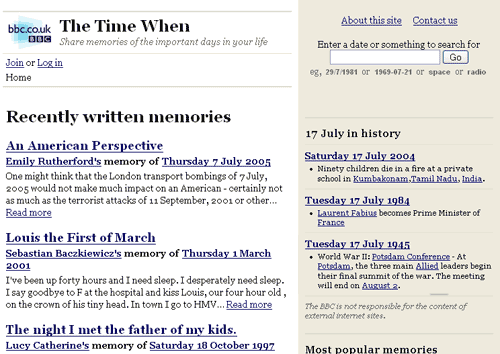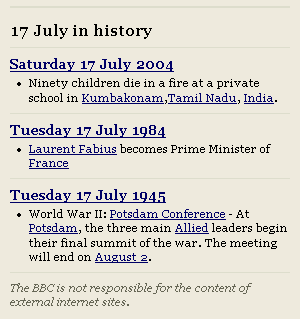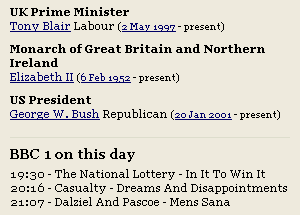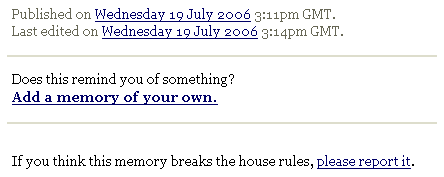The Time When trial from the BBC
Over the last couple of weeks I've been looking at a trial online service from the BBC called "The Time When". The premise is quite simple, that people annotate a diary with their memories of the time when something happened to them.
The homepage of the site showcases excerpts of the most recently submitted memories. Each features a title, a user attribution, and a date, and all these three act as deep links into the content of the site.

Each date has an individual page, and each page has a side-panel featuring this day in history style information. Some of this is borrowed from the BBC's own 'On This Day' site, but it also features deep links to relevant Wikipedia entries, further cementing the latter's reputation for being a part of the web rather than merely a website.

The pages also carry information on who was the UK's Prime Minister on that date, and the UK's monarch. Additionally they carry information on who was the President of the USA at the time. That seemed an odd choice to me - why not something closer to home like who was the leader of the Opposition or the Archbishop of Canterbury or even the Pope?
There is also an indication of what was on BBC One during prime-time that evening - it would be great to see that expanded in the future to include the ability to view or download clips of any archived programmes (especially the news) that were available for that day.

Entering your memories is easy, although one drawback of this standalone prototype is that the registration process is not the BBC's standard one, so you can't just use your existing BBC account. Memories are added using a form rather like that for blog comments, with limited HTML allowed for linking and for style purposes.
There is also a field encouraging users to tag their stories with geographical information. I wondered if there was scope here in the future to also allow users to specify the geographical location of their memory with either a postcode look-up or a UK address gazetteer. Pinning more precise spatial data to each memory would open up the scope for a whole different visual browse mechanism for the site via a map interface.
There isn't an ability to comment on other peoples memories - instead users are urged at the bottom of each memory to add their own with a call to action.

From each individual day page you can browse forward and backwards in time using a standard blog-style navigation. One thing I didn't notice though was anything like a monthly or annual calendar page to aid browsing of the site.

Search on the site allows you to either use different types of date formats to narrow down to a specific page, or to perform a free-text search on the contents of people's memories. I liked the fact that there is a prominent search tip underneath the input box indicating which kind of date format needs to be entered.

There is something very nice and un-BBC about the simplicity of the prototype at the moment. Aside from the lack of global branding and the fact that it is hosted at its own domain, it lacks a lot of the clutter that some BBC sites dispaly.
What I like about it most as a proposition is that it takes something that was a success in digitally capturing people's memories - The People's War - and expands it across the living memory of the whole of the British Isles, not just confined to one era or topic.
At so many crucial points in history we only hear the voices of the great and the good, the state and the church. I think that is why the bawdy graffiti on the bar walls in Pompeii is so interesting - because we seldom hear the colloquial voice of the average person. The DIY publishing boom of the internet may to an extent change that for future historians, as will the huge number of photographs and videos now being taken.
It seems to me that the BBC is well placed within the UK to try and weave that explosion of personal content into a comprehensive narrative that mixes the best of the BBC's archived output with the best of the collective memory and 'citizen history' that they can tap into. I've always thought that the 'On This Day' proposition, despite encouraging users to submit their memories, never really makes enough of the kind of personal accounts and memories it is able to harness, shunting them away from the main story page. 'The Time When' looks like it could be able to finally wrap that kind of layer of user generated content on top of the BBC's own almanac.
So glad you have enjoyed The Time When. We are working on adding calendar views. And have just added RSS feeds - so you can have The Time When whenever you want it.